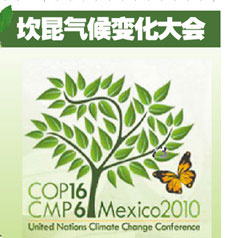Views from the East: Climate Change
 Just Another Copenhagen...
Just Another Copenhagen...
Reporting from Cancun, Zhang Bin (張斌) of The Economic Observer's News Department argues that this meeting is no different from the one that was held in Copenhagen last year:
~Though the various representatives are eager to express their opinions at the meeting, there is still much division among participants and though several proposals have been put forward for both developed and developing countries in terms of carbon emission targets, it still appears that many countries are having difficulty making the decision on what they are willing to commit to.
~As for the question of how to finance efforts to reduce global carbon emissions, some countries suggest establishing a new capital management agency, while others prefer that the World Bank step up and play a key role. Opinions are also divided on the specific amount each country should contribute to any such fund and how the money will be allocated among countries.
Original article: [Chinese]
Stop Your Petty Quarrels and Get on With it
Wang Dong with the ChinaEconomic Times believes the ecological crisis that climate change threatens to create is more about a conflict of interest between states than a natural disaster and that it was the divergence of national interests that led to the stalling of negotiations at the Copenhagen conference last year:
~Although every country has its own concerns and thus has a right to choose a position that best meets its own interest, climate change is not a challenge that is facing any one single country, rather it's a matter of the future of our earth. The interest of the whole world should be put ahead of that of any individual country.
~No matter who impedes today's negotiations, it will be the whole world and all whom inhabit it that will pay the price of failing to properly deal with climate change. ~We have already missed the chance to prevent current disasters; we should not let the chance of correcting our mistakes be destroyed by petty quarrels and ignorance.
Original article: [Chinese]

Hope Exists that Cancun Won't be Another Copenhagen
An article that was published by Xinhua shows Chinese optimism about the Cancun Summit despite Copenhagen's failure:
~Though the focus of both summits has been climate change, Cancun is different from Copenhagen.
~While the latter was attended by officials from ministerial levels to heads of state, the former is a meeting of mere ministerial representatives, shortening the decision-making process.
~Another highlight in Cancun is that Espinosa, Mexico's Minister of Foreign Affairs, stated, "There won't be any back-door negotiation or secret accords".
~Additionally, as all the participant countries have already clearly stated points they refuse to compromise on as well as points where they are open to discussion, it has been easier for the conference to gain results.
~However, problems remain. America will not fulfill their carbon emission goals unless they are approved by congress and Japan has even claimed that it will never agree to the second commitment period of the Kyoto Protocol.
Original article: [Chinese]
Cancun's Warmth is a Bit Cold
An article featured in China National Radio reports on what steps countries need to take in Cancun to ensure results:
~According to CCTV, the UN Climate Change Conference in Cancun, Mexico has covered over half of its agenda. The climate pact and the Kyoto Protocol are currently being discussed, but obviously differences still exist.
~Xie Zhenhua, head of the Chinese delegation has had a series of bilateral talks since he arrived last Sunday. This Monday, he had bilateral talks with a delegate from the United States.
~ Xie said little progress had been made during negotiations, but negotiations are still headed in the expected direction because the Chinese delegation went to Cancun with sincerity.
~If positive results come out of the next negotiation that means the two work groups were able to develop a consensus about some items – a consensus that must be strengthened. Because different countries have different levels of development, you cannot satisfy everyone, but perhaps negotiators will come up with the best result.
Original article: [Chinese]

Chinese Netizens Unconcerned about Pollution
Phoenix Net reported a survey that it conducted along with international NGOs in which 170,041 people participated. The survey included questions about climate change:
~Those surveyed were asked about their knowledge of the possible consequences of global warming: 66,833 people (39.3 percent) chose the response, "most people know about it, but do not realize that it has anything to do with themselves"; 35 percent choose "most people realize that it has something to do with themselves, but do not take action".
~58.5 percent of those surveyed believe most people know about the concept of a low carbon lifestyle, but do not think it has anything to do with them.
Original article: [Chinese]
The views posted here belong to the commentor, and are not representative of the Economic Observer |
Related Stories
Popular

- INTERVIEW
- Interview with Artur Runge-Metzger
- The EO conducted an interview with Artur Runge-Metzger about the progress of the conferenc...
Interactive
Multimedia

- EEO.COM.CN The Economic Observer Online
- Bldg 7A, Xinghua Dongli, Dongcheng District
- Beijing 100013
- Phone: +86 (10) 6420 9024
- Copyright The Economic Observer Online 2001-2011
















